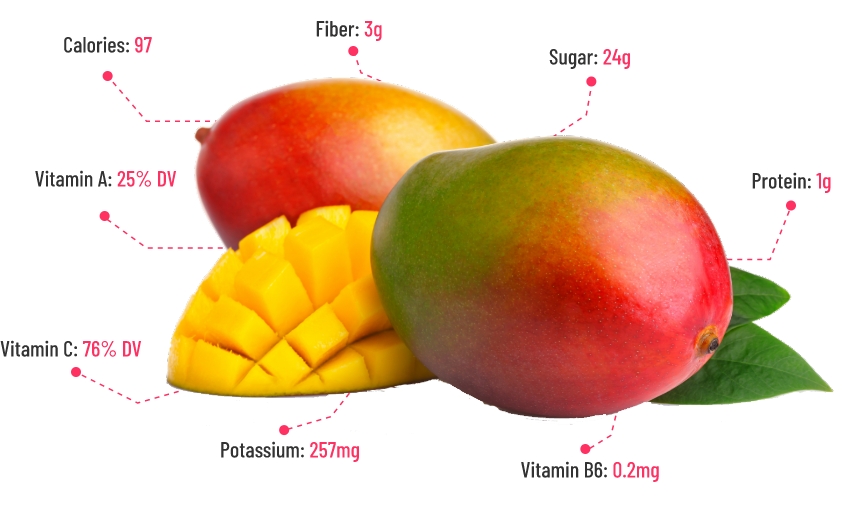

Mangos are an edible stonefruit and contain over 20 different vitamins and minerals, helping to make them a superfood. The most common type of Mango in the US is the Tommy Atkins, but there are over 500 different varieties world wide.

Contains 76% DV of Vitamin C which aids your immune system, helps your body absorb iron, and promotes cell growth and repair.
Mango is also a good source of the minerals copper and folate, which are especially important nutrients during pregnancy, as they support healthy fetal growth and development.
One cup (165 grams) of fresh mango contains fewer than 100 calories and has a very low calorie density, meaning that it has few calories for the volume of food it provides.
One study concluded that consuming fruits and vegetables high in vitamin C and carotenoids could help prevent the onset of diabetes. Mango is high in both these nutrients.
Antioxidants are important compounds that defend your cells against molecules called free radicals. In high amounts, free radicals can damage your cells, and this damage has been linked to conditions like heart disease, diabetes, and many types of cancer.
Mangoes are high in polyphenols, which are plant compounds that act as antioxidants to protect your body.
Mangoes are high in vitamin C, a nutrient that may help boost your immune system and lower your blood pressure.
Also, vitamin C could help wounds recover faster by reducing inflammation and stimulating collagen production. Collagen is an essential protein that aids wound repair.
Mango contains magnesium and potassium, which help maintain a healthy blood flow. These nutrients help your blood vessels relax, promoting lower blood pressure levels.
They are also full of Vitamin A, Lutein and Zeaxanthin which are known to support healthy eyes.
Mango contains a group of digestive enzymes called amylases. Amylases break down complex carbs into sugars, such as glucose and maltose. These enzymes are more active in ripe mangoes, which is why they’re sweeter than unripe ones.
Also, since mango contains plenty of water and dietary fiber, it may help with digestive issues like constipation and diarrhea.
Mangoes are high in polyphenols which may help stop the expression of genes that promote cancer progression